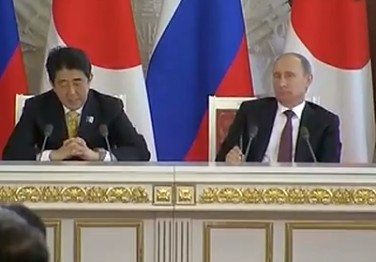By Hou Juan, doctorate scholar major in International Relations from China Foreign Affairs University
On account of pending territorial disputes and sensitive US-Russia relations, little is expected from Japanese Prime Minister Shinzo Abe's upcoming visit to Russia in May. An agreement has been reached recently between Russian Foreign Minister Sergei Lavrov and his Japanese counterpart Fumio Kishida, along with a consensus to launch negotiations for a peace treaty.

Japan and Russia have made a deal out of practical interests, since Moscow's relations with the West remain tense. Japanese-Russia bilateral relations' warm spirit does carry a positive message.
Tokyo expects better relations with Moscow to deal with domestic and diplomatic challenges and to make progress over resolving a dispute over its northern territories.
Ever since Abe assumed office for the second time, Japan has attracted many diplomatic enemies and has gotten more isolated in Northeast Asia including countries, such as China, Russia and South Korea. Tokyo craves relief from tensions.
On the other hand, Moscow faces sanctions imposed by Western countries, and its economic social development has gone stale, which gives Japan a chance to exploit the matter.
Overly-influenced by the United States, Japan was compelled to enforce sanction on Russia. Yet recent mitigating relations between the US and Russia give Tokyo an opportunity to develop its tie with Moscow.
Abe's administration has been losing credit in rejuvenating Japan's economy, especially after introducing the heavily-criticized new security bills.
Abe seeks to develop Japan-Russia relations to resolve northern territorial disputes in order to win back public support. Meanwhile, Russia hopes to break away from economic and social stalemate and requests that Japan no longer impose Western sanctions against them.
Influenced by a big drop in oil prices and sanctions, Russia's economy is forecast to plummet another 1.9 percent, according to the World Bank. Its poverty rate has increased to record highs over the last ten years.
Japan's reaching out for a relationship with Russia could demonstrate a weak point on the sanction chain to divide Japan's ties with the US and the European Union so as to alleviate economic pressures and destroy diplomatic isolation.
Russia's Far East development program was launched after Putin took office, which needs financial and technical support from Japan. Tokyo and Moscow hope to develop stronger bilateral relations. Yet, actual changes might not result from Abe’s pending visit.
Big differences on the northern territory issue were revealed during the foreign ministers' meeting. Russia saw it as a legacy of the Second World War that Japan must accept, whereas Japan held that the return of the four northern islands should be a precondition to sign a peace treaty.
Accordingly, Tokyo lacks diplomatic flexibility from the Washington's impact, which could weaken Japan-Russia relations in the future.
The upcoming summit meeting between the two countries means more of a relaxation on bilateral ties instead of generating essential results. To pacify the US, Abe's visit to Russia was declared informal and the meeting place will be in Sochi.

Hou Juan, doctorate scholar major in International Relations from China Foreign Affairs University
( The opinions expressed here do not necessarily reflect the opinions of Panview or CCTV.com. )

Panview offers an alternative angle on China and the rest of the world through the analyses and opinions of experts. We also welcome outside submissions, so feel free to send in your own editorials to "globalopinion@vip.cntv.cn" for consideration.















